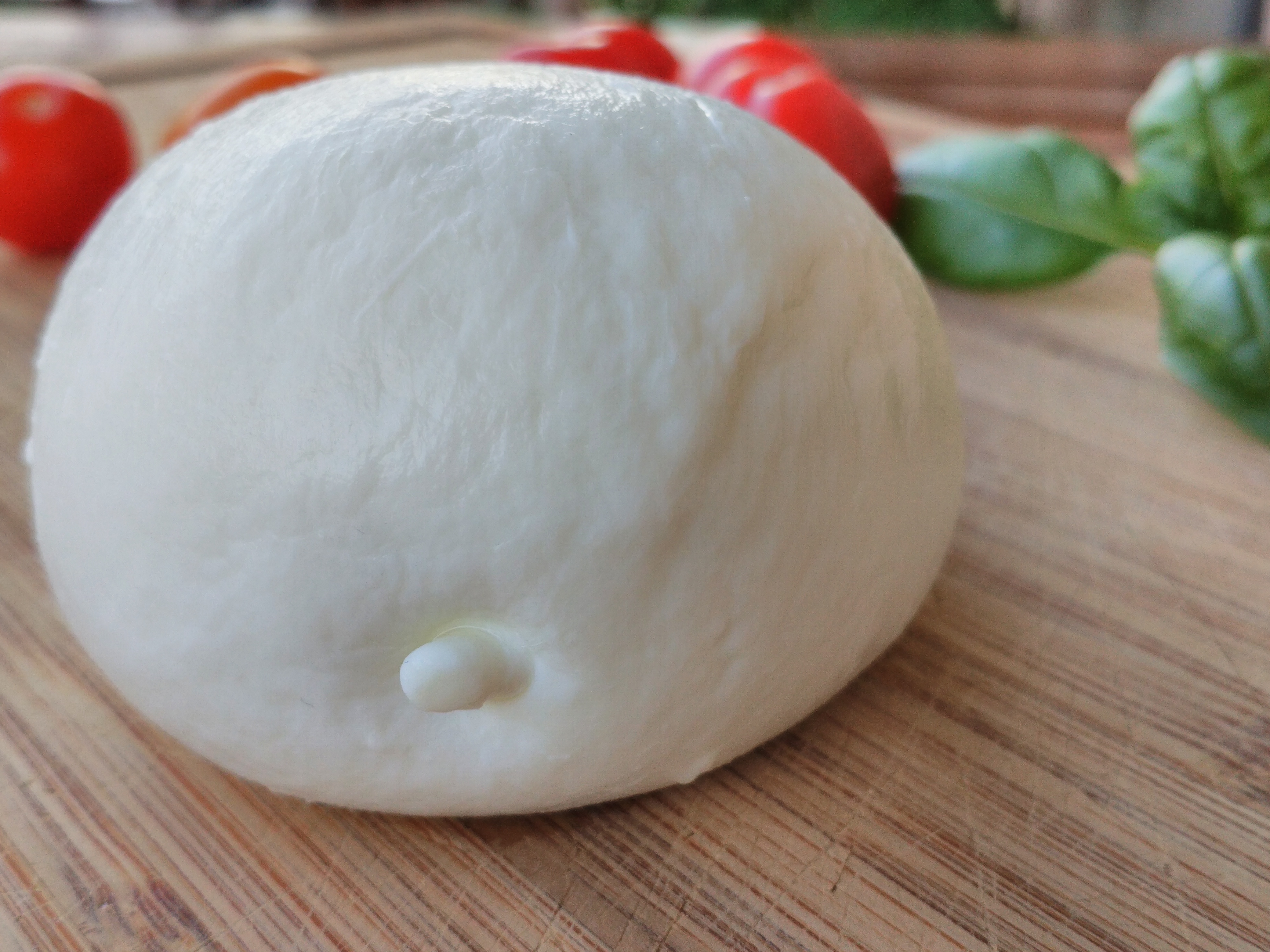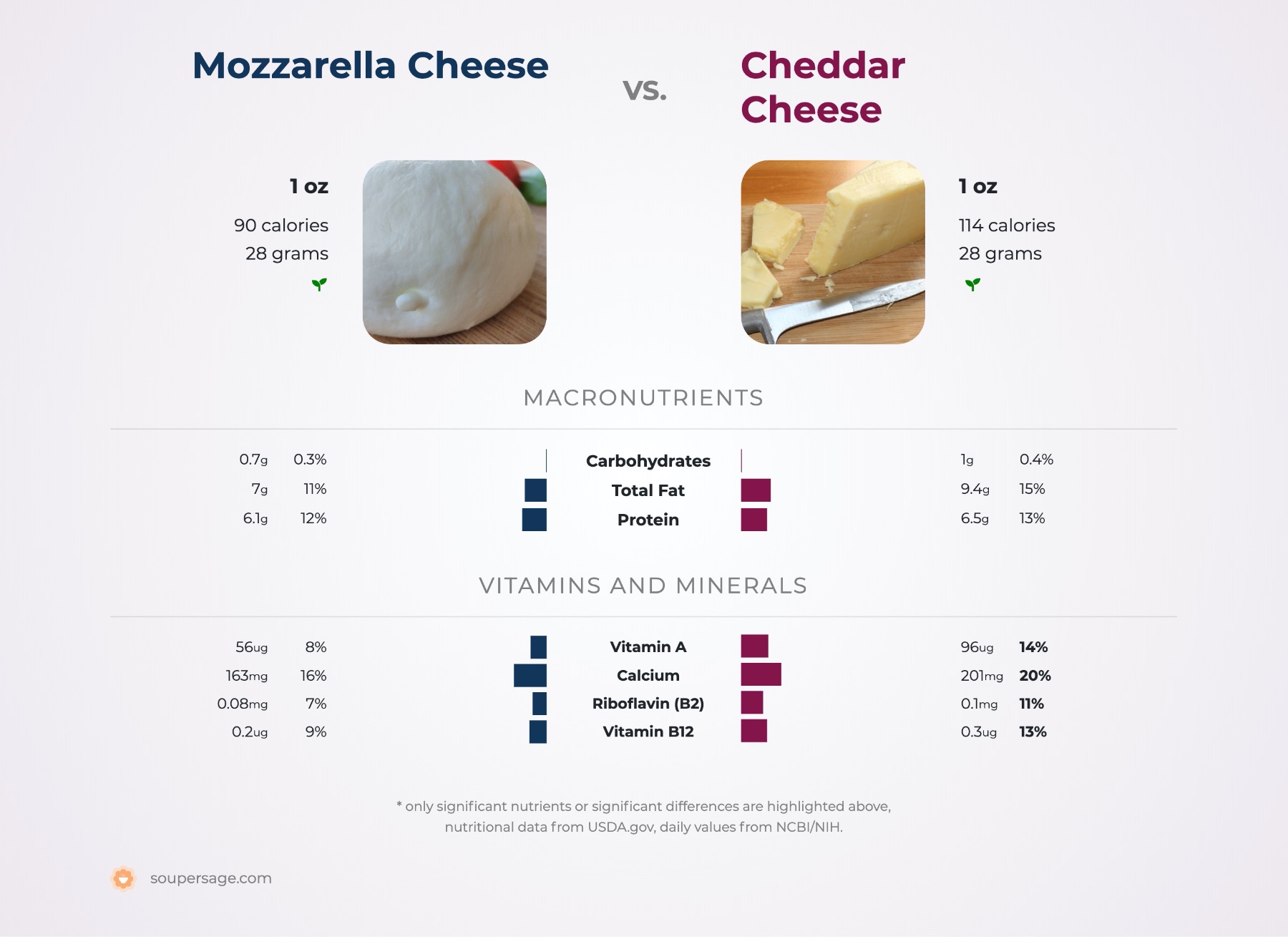Cheddar Cheese vs. Mozzarella Cheese
Nutrition comparison of Cheddar Cheese and Mozzarella Cheese
Ever wonder how your favorite foods stack up against each other in terms of nutrition?
We compared the nutritional contents of
cheddar cheese
versus
mozzarella cheese
(100g each)
below using 2020 USDA and NIH data[1].
For a quick recap of significant nutrients and differences in cheddar cheese and mozzarella cheese:
- Both mozzarella cheese and cheddar cheese are high in Vitamin A, calcium, calories, protein and saturated fat.
- Cheddar cheese has more thiamin, pantothenic acid and folate, however, mozzarella cheese contains more niacin.
- For omega-3 fatty acids, cheddar cheese has more dpa than mozzarella cheese.
USDA sources for nutritional information: Cheddar Cheese (Cheese, cheddar) and Mozzarella Cheese (Cheese, mozzarella, whole milk, low moisture) . Have a correction or suggestions? Shoot us an email.
Calories and Carbs
calories
Both mozzarella cheese and cheddar cheese are high in calories. Cheddar cheese has 27% more calories than mozzarella cheese - mozzarella cheese has 318 calories per 100 grams and cheddar cheese has 403 calories.
For macronutrient ratios, cheddar cheese is lighter in protein, heavier in fat and similar to mozzarella cheese for carbs. Cheddar cheese has a macronutrient ratio of 23:4:74 and for mozzarella cheese, 27:3:70 for protein, carbohydrates and fat from calories.
Macro Ratios from Calories:
| Cheddar Cheese | Mozzarella Cheese | |
|---|---|---|
| Protein | 23% | 27% |
| Carbohydrates | 4% | 3% |
| Fat | 74% | 70% |
| Alcohol | ~ | ~ |
carbohydrates
Both mozzarella cheese and cheddar cheese are low in carbohydrates - mozzarella cheese has 2.5g of total carbs per 100 grams and cheddar cheese has 3.4g of carbohydrates.
sugar
Mozzarella cheese and cheddar cheese contain similar amounts of sugar - mozzarella cheese has 1g of sugar per 100 grams and cheddar cheese has 0.48g of sugar.
Protein
protein
Both mozzarella cheese and cheddar cheese are high in protein. Mozzarella cheese is very similar to mozzarella cheese for protein - mozzarella cheese has 21.6g of protein per 100 grams and cheddar cheese has 22.9g of protein.
Fat
saturated fat
Both mozzarella cheese and cheddar cheese are high in saturated fat. Cheddar cheese has 21% more saturated fat than mozzarella cheese - mozzarella cheese has 15.6g of saturated fat per 100 grams and cheddar cheese has 18.9g of saturated fat.
cholesterol
Mozzarella cheese and cheddar cheese contain similar amounts of cholesterol - mozzarella cheese has 89mg of cholesterol per 100 grams and cheddar cheese has 99mg of cholesterol.
Vitamins
Vitamin A
Both mozzarella cheese and cheddar cheese are high in Vitamin A. Cheddar cheese has 71% more Vitamin A than mozzarella cheese - mozzarella cheese has 197ug of Vitamin A per 100 grams and cheddar cheese has 337ug of Vitamin A.
Vitamin D
Mozzarella cheese and cheddar cheese contain similar amounts of Vitamin D - mozzarella cheese has 18iu of Vitamin D per 100 grams and cheddar cheese has 24iu of Vitamin D.
Vitamin E
Mozzarella cheese and cheddar cheese contain similar amounts of Vitamin E - mozzarella cheese has 0.21mg of Vitamin E per 100 grams and cheddar cheese has 0.71mg of Vitamin E.
Vitamin K
Mozzarella cheese and cheddar cheese contain similar amounts of Vitamin K - mozzarella cheese has 2.5ug of Vitamin K per 100 grams and cheddar cheese has 2.4ug of Vitamin K.
The B Vitamins
Cheddar cheese has more thiamin, pantothenic acid and folate, however, mozzarella cheese contains more niacin. Both cheddar cheese and mozzarella cheese contain significant amounts of riboflavin, Vitamin B6 and Vitamin B12.
| Cheddar Cheese | Mozzarella Cheese | |
|---|---|---|
| Thiamin | 0.029 MG | 0.016 MG |
| Riboflavin | 0.428 MG | 0.27 MG |
| Niacin | 0.059 MG | 0.094 MG |
| Pantothenic acid | 0.41 MG | 0.071 MG |
| Vitamin B6 | 0.066 MG | 0.062 MG |
| Folate | 27 UG | 8 UG |
| Vitamin B12 | 1.1 UG | 0.73 UG |
Minerals
calcium
Both mozzarella cheese and cheddar cheese are high in calcium. Cheddar cheese has 23% more calcium than mozzarella cheese - mozzarella cheese has 575mg of calcium per 100 grams and cheddar cheese has 710mg of calcium.
iron
Mozzarella cheese and cheddar cheese contain similar amounts of iron - mozzarella cheese has 0.2mg of iron per 100 grams and cheddar cheese has 0.14mg of iron.
potassium
Mozzarella cheese and cheddar cheese contain similar amounts of potassium - mozzarella cheese has 75mg of potassium per 100 grams and cheddar cheese has 76mg of potassium.
Antioxidants and Phytonutrients
carotenoids
Carotenoids are micronutrients commonly found in plants and some animal products. An example is beta-carotene, the notable carotenoid which is a popular source of Vitamin A.[4][5]
For specific types of carotenoids, both cheddar cheese and mozzarella cheese contain significant amounts of beta-carotene.
| Cheddar Cheese | Mozzarella Cheese | |
|---|---|---|
| beta-carotene | 85 UG | 63 UG |
Omega-3 and Omega-6
omega 3s
For omega-3 fatty acids, cheddar cheese has more DPA than mozzarella cheese per 100 grams. Both cheddar cheese and mozzarella cheese contain significant amounts of alpha linoleic acid (ALA).
| Cheddar Cheese | Mozzarella Cheese | |
|---|---|---|
| alpha linoleic acid | 0.114 G | 0.212 G |
| DHA | 0.001 G | ~ |
| EPA | 0.01 G | ~ |
| DPA | 0.017 G | ~ |
| Total | 0.142 G | 0.212 G |
omega 6s
Comparing omega-6 fatty acids, cheddar cheese has more linoleic acid than mozzarella cheese per 100 grams.
| Cheddar Cheese | Mozzarella Cheese | |
|---|---|---|
| other omega 6 | 0.036 G | ~ |
| linoleic acid | 1.171 G | 0.566 G |
| Total | 1.207 G | 0.566 G |
Customize your serving size
The comparison below is by common portions, e.g. cups, packages. You can also see a more concrete comparison by weight at equal weight (by grams) comparison.
Note: The specific food items compared are: Cheddar Cheese (Cheese, cheddar) and Mozzarella Cheese (Cheese, mozzarella, whole milk, low moisture) .
Cheddar Cheese g
()
|
Daily Values (%) |
Mozzarella Cheese g
()
|
|||||
|---|---|---|---|---|---|---|---|
| KCAL % |
|
5% | calories | 5% |
|
KCAL % | |
| G % |
|
5% | carbohydrates | 5% |
|
G % | |
| G % |
|
5% | dietary fiber | 5% |
|
G % | |
| G | 5% | sugar | 5% | G | |||
| G % |
|
5% | total fat | 5% |
|
G % | |
| G % |
|
5% | saturated fat | 5% |
|
G % | |
| G | 5% | monounsaturated fat | 5% | G | |||
| G | 5% | polyunsaturated fat | 5% | G | |||
| G | 5% | trans fat | 5% | G | |||
| MG | 5% | cholesterol | 5% | MG | |||
| MG % |
|
5% | sodium | 5% |
|
MG % | |
| 5% | Vitamins and Minerals | 5% | |||||
| UG % |
|
5% | Vitamin A | 5% |
|
UG % | |
| MG % |
|
5% | Vitamin C | 5% |
|
MG % | |
| IU % |
|
5% | Vitamin D | 5% |
|
IU % | |
| MG % |
|
5% | calcium | 5% |
|
MG % | |
| MG % |
|
5% | iron | 5% |
|
MG % | |
| MG % |
|
5% | magnesium | 5% |
|
MG % | |
| MG % |
|
5% | potassium | 5% |
|
MG % | |
| MG % |
|
5% | thiamin (Vit B1) | 5% |
|
MG % | |
| MG % |
|
5% | riboflavin (Vit B2) | 5% |
|
MG % | |
| MG % |
|
5% | niacin (Vit B3) | 5% |
|
MG % | |
| MG % |
|
5% | Vitamin B6 | 5% |
|
MG % | |
| MG % |
|
5% | pantothenic acid (Vit B5) | 5% |
|
MG % | |
| UG % |
|
5% | folate (Vit B9) | 5% |
|
UG % | |
| UG % |
|
5% | Vitamin B12 | 5% |
|
UG % | |
| MG % |
|
5% | Vitamin E | 5% |
|
MG % | |
| UG % |
|
5% | Vitamin K | 5% |
|
UG % | |
| G % |
|
5% | protein | 5% |
|
G % | |
| UG % |
|
5% | biotin (Vit B7) | 5% |
|
UG % | |
| MG % |
|
5% | choline | 5% |
|
MG % | |
| MG % |
|
5% | chlorine | 5% |
|
MG % | |
| UG % |
|
5% | chromium | 5% |
|
UG % | |
| MG % |
|
5% | copper | 5% |
|
MG % | |
| UG % |
|
5% | fluoride | 5% |
|
UG % | |
| UG % |
|
5% | iodine | 5% |
|
UG % | |
| MG % |
|
5% | manganese | 5% |
|
MG % | |
| UG % |
|
5% | molybdenum | 5% |
|
UG % | |
| MG % |
|
5% | phosphorus | 5% |
|
MG % | |
| UG % |
|
5% | selenium | 5% |
|
UG % | |
| MG % |
|
5% | zinc | 5% |
|
MG % | |
| G | 5% | Water | 5% | G | |||
| G | 5% | Starch | 5% | G | |||
| G | 5% | Alcohol | 5% | G | |||
FAQ
Does mozzarella cheese or cheddar cheese contain more calories in 100 grams?Both mozzarella cheese and cheddar cheese are high in calories. Cheddar cheese has 30% more calories than mozzarella cheese - mozzarella cheese has 318 calories in 100g and cheddar cheese has 403 calories.
Does mozzarella cheese or cheddar cheese contain more calcium?
Both mozzarella cheese and cheddar cheese are high in calcium. Cheddar cheese has 20% more calcium than mozzarella cheese - mozzarella cheese has 575mg of calcium in 100 grams and cheddar cheese has 710mg of calcium.


